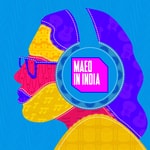TNQ Sciences – Details, episodes & analysis
Podcast details
Technical and general information from the podcast's RSS feed.

TNQ Sciences
Maed in India
Frequency: 1 episode/122d. Total Eps: 2

TNQ Sciences is a podcast connected with TNQ’s annual Distinguished Lectures. This lecture series aims to bring internationally renowned scientists face-to-face with the Indian scientific community. The podcast is in the form of an interview of each year’s speaker by a well-known Indian science journalist, Dr Ramaseshan Ramachandran. Each interview attempts to explore the story behind the work of these scientists and the impact of their scientific research.
Recent rankings
Latest chart positions across Apple Podcasts and Spotify rankings.
Apple Podcasts
🇫🇷 France - lifeSciences
20/11/2024#76🇫🇷 France - lifeSciences
19/11/2024#85🇫🇷 France - lifeSciences
18/11/2024#82
Spotify
No recent rankings available
Shared links between episodes and podcasts
Links found in episode descriptions and other podcasts that share them.
See all- https://www.instagram.com/maemariyam
344 shares
- https://www.instagram.com/sfanthome
186 shares
- https://www.maedinindia.in/
156 shares
- https://www.tnq.co.in/
4 shares
RSS feed quality and score
Technical evaluation of the podcast's RSS feed quality and structure.
See allScore global : 63%
Publication history
Monthly episode publishing history over the past years.
Using AI To Solve Biology Problems in Minutes Featuring Google DeepMind’s John Jumper
Episode 2
samedi 10 août 2024 • Duration 01:00:01
In this episode of TNQ Sciences, Dr John Jumper, a recipient of the Breakthrough Prize, talks about his work on AlphaFold, the AI tool which predicts the three-dimensional structure of proteins. As the project lead, Dr Jumper discusses the intricacies and difficulties in predicting accurate protein structures and how biology as a science is perfectly suited to using the tools of AI to find solutions to such complex questions, which usually take years, in a couple of minutes. Dr. Jumper also breaks down the difference between machine learning and deep learning and how these powerful tools of AI will change the future of science and discovery.
Joining him in conversation is Ramaseshan Ramachandran, well-known science journalist and former science correspondent for The Hindu newspaper and Frontline Magazine.
To know more about Dr John Jumper and his work, visit https://www.tnq.co.in/johnjumper/
To know more about TNQ and the Distinguished Lectures series, visit https://www.tnq.co.in/
CREDITS
Host: Dr Ramaseshan Ramachandran
Guest: Dr John Jumper
Produced and Created for TNQ
This is a Maed in India production
Head of Production: Mae Mariyam Thomas
Project Manager: Shaun Fanthome
Producer: Sean D’mello, Ruchi Sawardekar
Sound Editor & Mix Engineer: Kartik Kulkarni
How We Sense Pain? Featuring Nobel laureate Professor David Julius
Episode 1
mercredi 10 avril 2024 • Duration 56:44
In this episode of TNQ Sciences, Professor David Julius, a physiologist and Nobel Prize laureate, talks about his work on molecular mechanisms for pain sensation and heat including the characterization of the TRP-V1 and TRP-M8 receptors that detect capsaicin, menthol, and temperature. We get to know why birds don’t respond to capsaicin, thresholds for TRP receptors and whether they're affected by regional or racial differences, and his seminal contribution of the neural and molecular basis for the sense of temperature and pain.
Joining him in conversation is Ramaseshan Ramachandran, well-known science journalist and former science correspondent for The Hindu newspaper and Frontline Magazine.
To know more about Dr David Julius and his work, visit https://www.tnq.co.in/davidjulius/
To know more about TNQ and the Distinguished Lectures series, visit https://www.tnq.co.in/
CREDITS
Host: Dr Ramaseshan Ramachandran
Guest: Professor David Julius
Produced and Created for TNQ
This is a Maed in India production
Head of Production: Mae Mariyam Thomas
Project Manager: Shaun Fanthome
Producer: Sean D’mello, Ruchi Sawardekar
Sound Editor & Mix Engineer: Kartik Kulkarni







